- Home
- Cornelia Funke
Ghosthunters and the Incredibly Revolting Ghost
Ghosthunters and the Incredibly Revolting Ghost Read online
Ghosthunters
and the
Incredibly
Revolting
Ghost
by CORNELIA FUNKE
For Stefan, Pascale, and Marie
Contents
Cover
Title Page
1. A Horrible Day
2. Teased and Scorned!
3. Hetty Hyssop
4. Slimy Trails in the Dark
5. A Terrible Story
6. A Serious problem
7. The Book of Ghosts
8. A Wailing and Gnashing of Teeth
9. A Bucketful of Graveyard Dirt
10. Nothing but Trouble
11. The Haunted Villa
12. Chattering Teeth and Knocking Knees
13. The Plan
14. The Ghost Hunt
15. Revenge
In Case of an Encounter
Indispensable Alphabetical Appendix of Assorted Ghosts
Miscellaneous Listing of NECESSITOUS EQUIPMENT ANDNOTEWORTHY ORGANIZATIONS
Preview
Also By Cornelia Funke
About the Author
Copyright
1
It all began on one of those days — one of those stupid days when absolutely everything goes wrong.
First thing in the morning, when Tom tried to put on his jeans, he found that his darling sister had knotted the legs. Then he staggered into the bathroom, still half asleep. He brushed his teeth with Mom’s face cream and banged his head against a cupboard door that some idiot had left open in the kitchen. Enough disasters to last him an entire day. And he hadn’t even had breakfast yet.
Tom often had days like this. Stumbly, bumbly, everything-goes-wrong days. Well, at least everyone else got a good laugh out of them.
“Good morning,” said Mom.
“What’s so good about it?” snapped Tom.
Lola leaned back, smirking, to watch him. Lola was Tom’s big sister — almost six years older than he was, and hopelessly ahead of him in every possible way.
“Hey, watch out, everybody,” she said. “Something awful’s going to happen to Tom any minute now. It’s another of his ‘days'!”
Tom gave her a dirty look — and spilled his cocoa down his sweater. Cue shrieks of sisterly laughter.
“Oh Tom,” sighed Mom. “Go and get changed.”
“Lamebrain!” his sister called after him.
It continued at school, of course. Tom gave everyone a whale of a time. Everyone except himself. On the way home, he stepped in a load of dog-doo, and after he walked into a newsstand, knocking papers all over the pavement, he decided to go straight to bed as soon as he got home. On days like this, bed was the only safe place to be.
But just as he was about to disappear quietly into his bedroom, it happened.
“Tom,” said Mom. “Just run down and get some orange juice from the cellar, would you?”
From the cellar.
Mom knew full well that he was scared witless down there. Just the thought of the spiders gave him goose bumps — not to mention what else might be lurking in the darkness.
“Do I have to?” he asked.
“Oh no, don’t start with your ghost stories again!” said Mom. “Off you go!”
Merciless. That’s what she was. And he wasn’t even ten years old yet. Sighing, Tom opened the apartment door.
Tom’s family lived in a big building, where every apartment had its own cellar. But Tom was convinced that their cellar was by far the spookiest, the darkest, and the most spider-infested of all. And he knew exactly why.
The caretaker, Mr. Igor Grouchman, hated children. And since Tom and Lola were the only children in the building, their family had been given the most horrendous cellar. Obviously!
Standing outside the dusty door, Tom pursed his lips and boldly adjusted his glasses. The narrow, cold corridor lined by the cellar doors was only dimly lit, and Tom, as always, had trouble getting the wretched key into their lock. The door creaked ominously as Tom pushed it open.
A musty-smelling blackness yawned back at him.
Bravely, he took a step forward and fumbled for the light switch. Where on earth was the blasted thing?
It was an old-fashioned rotary switch, which you could easily sprain your fingers on. Phew, at last! There it was. Tom turned it. A pitifully small lightbulb flickered and — pop! — exploded into a thousand pieces.
Shocked, Tom stumbled backward — and hit the cellar door with his elbow. Clunk! The lock clicked shut. And there he was, standing in the pitch-black cellar, all alone.
Calm! he thought. Stay calm, Tom. It’s just the stupid lightbulb that exploded.
But since when did lightbulbs just explode?
Tom felt his mouth turn as dry as sandpaper. He tried to take a step backward. But his shoes were stuck to something slimy and wet. He listened to his own breathing, and then heard a quiet rustling. As if something was gently brushing against the old newspapers that Mom had piled up somewhere in the darkness.
“Help!” whispered Tom. “Oh please, help!”
“Aaaaaaahooooo,” came a moan from the darkness. Cold, musty-smelling breath chilled his face. And icy fingers gripped his throat.
“Get lost!” cried Tom, lashing out blindly. “Get lost, you disgusting thing!”
The icy fingers let go of his throat and pulled him by his ears. Tom could see something gleaming pale in the darkness. Something with garish green eyes, flapping hair, and a scornful smirk.
A ghost! thought Tom, petrified. A real ghost!
“Wooooooooooooooooooooooooh!” howled the dreadful creature.
With desperate strength Tom wrenched his feet free of the glued-down shoes. He staggered to the door and groped with trembling fingers for the bolt. The gruesome ghoul tugged at his hair and his jacket, and filled his ears with its terrible howling. With one last effort Tom pulled the door open; the ghost fell back with a furious screech — and Tom stumbled out into the corridor, half dead with shock.
2
All at once it was silent.
Dead silent.
Only the door creaked on its hinges. Tom gave it a shove and it slammed shut. He ran to the stairs, his knees shaking. Away! He just had to get away!
Tom had never climbed the three stories faster in his life, though he checked over his shoulder at almost every step. Panting, he reached the apartment and hammered on the door. From above, an indignant Miss Parker peered down at him over the banisters. With her tiny head and pointy nose, she looked like an old crow.
“Well, don’t you look a mess, Tom,” she said disapprovingly.
Tom pushed his glasses straight, ran a hand over his matted hair, and gave her an embarrassed smile.
Then he hammered on the door again.
“Whatever’s got into you?” asked Mom, annoyed, and, to Miss Parker’s disappointment, dragged him into the apartment. Exhausted, Tom leaned against the wall.
“I told you!” he blurted out. “I kept telling you, and nobody believed me!” He could only just suppress a sob.
“What did you keep telling me?” asked Mom. “And where are your shoes?”
Lola’s bedroom door opened. “Hey, just look at him this time,” she said, giggling.
“There’s a ghost in our cellar!” whispered Tom. “It — it tried to strangle me and . . .”
The rest of his sentence was drowned out by Lola’s howling laughter. “A ghost! Wow, Tommy-boy, you really are one of a kind!”
Typical. He had just only narrowly escaped death, and what did he get from his family? Mockery and scorn!
“Leave him alone, Lola!” said Mom, givi
ng Tom that searching look he so hated. “Come on now, what’s the matter?”
Tom looked down at his socks. “There’s a ghost down there!”
“Lola,” said Mom. “Please take Tom back down to the basement and show him that there’s absolutely nothing in the cellar except bottles of juice and old newspapers. And get his shoes!”
Horrified, Tom stared at her. “I’m not going back down there! Do you think I’m crazy or what?”
But Mom just opened the door.
Grinning, Lola took his hand and dragged him to the stairs. “Come on,” she said. “I want to see your ghost!”
As Tom knew that any further resistance was futile, he followed her.
“It’ll kill us,” he warned. “You’ll see. It’ll kill us!”
“Of course!” said Lola.
And then there they were again: in the basement, in front of their cellar door. “Hiya, ghost!” cried Lola, pushing the door open. “Now you’re in for it!”
Pitch-black and silent the cellar lay before them. Holding his breath, Tom peeped out from behind Lola’s back. But nothing stirred. Absolutely nothing. No “wooooooooooooh"; no icy fingers.
Whistling, Lola took a couple of steps into the darkness. “What’s wrong with that wretched light?” she grumbled.
“The lightbulb exploded,” whispered Tom. He was still standing in the corridor while Lola crashed around in the darkness.
“Ugh, what’s that stuff?” Tom heard her cursing. “It’s all sticky! What were you doing down here?”
“Getting two bottles of orange juice,” Tom mumbled, taking one cautious step toward the door. But there was no trace of the white something with the garish green eyes and the scornful smirk.
Oh boy, he’d never live this down.
“Here!” said Lola, shoving his shoes at him. The soles were covered with some kind of silvery, shiny, sticky stuff.
“Ghost slime!” whispered Tom.
“Get a life,” snorted Lola. “There’s probably just some mutant snail in here.” Giggling, she vanished into the darkness again. “So where’s the orange juice?” she asked.
Tom didn’t answer. He was staring at the white hand that had emerged from the darkness and was waving at him.
“There!” he cried. “Look out, Lola!”
Crash! Tom heard the sound of breaking glass in the darkness. “Have you gone raving mad?” screeched Lola, and the next moment she was standing beside him, huffing with rage and holding a broken bottle. “You can explain that to Mom. At least three bottles are smashed.”
“But there it is again!” cried Tom in desperation. “There, there!” The hand had disappeared.
“You’re nuts!” said Lola and slammed the cellar door shut. “You’re completely nuts. But I’ll tell you one thing: I will not clean up that mess. You’ll do that. Maybe your ghost will help you.”
“It’s there!” yelled Tom. “I saw it, you stupid cow.”
“Yeah, whatever,” said Lola, heading for the stairs. “You also saw a flying saucer once, remember, and that turned out to be nothing but an airplane. Ha!”
“But I was only a little kid then!” shouted Tom while he stumbled behind her, shaking with rage.
“You’re still a little kid,” said Lola, taking the stairs two at a time with her long, slim legs. “And, what’s more, you’re a lunatic.”
Mom cleaned up the mess because of the broken glass. “Otherwise you’ll end up cutting yourself on top of everything else!” she said. Then she shook her head and sighed.
Dad said, “That boy has an overactive imagination.”
And Lola told everyone that her brother had now officially completely lost it.
But Tom knew what he had seen. He steadfastly refused to go anywhere near the cellar, and just waited for Sunday to arrive. On Sundays Grandma came over for dinner. She listened to him without constantly frowning — unlike his parents.
But he still had three days — and, above all, three nights — to get through until Sunday. During the day Tom barely dared to walk down the stairs; and during the night he just lay in bed with his heart pounding, staring into the darkness. That was the really scary thing about ghosts: You never knew whether they would simply float through the walls or the ceiling. By Sunday Tom had dark circles under his eyes and was completely exhausted.
“What on earth’s the matter with you?” asked Grandma when she saw him. “Are you ill?”
“Of course he isn’t — he’s just making up stories again,” said Lola. “He’s been seeing ghosts lately!”
Grandma looked thoughtfully at Tom, took him by the hand, and led him off into his bedroom.
“Well?” she said, folding her short, fat arms. “Fire away, my friend. What happened?”
And Tom told her. About the exploding lightbulb; about the icy fingers and the garish green eyes; about the “wooooooooooooooh” and the white hand that waved at him.
“Hmm!” said Grandma when he had finished. “This is serious business, but I’m afraid I can’t help you.”
“You can’t?” murmured Tom, his head drooping.
“However,” said Grandma, tugging at her pearl necklace as she always did when she gave something serious thought, “I do have a friend who knows about ghosts. I’ll give you her address.”
Perhaps there was some hope left in the world after all.
3
The very next Monday, Tom set off after school. He knew that address. It was the same street as the dentist’s Mom kept dragging him to. Hopefully that wasn’t a bad omen.
Grandma’s friend lived in a narrow, dark house with four doorbells. The topmost bell had her name written beside it: hetty hyssop.
I hope she’s not as weird as her name, thought Tom as he rang the bell. He had to wait a while for someone to open the door. As he climbed the dark stairs, he had a horribly queasy feeling in his stomach.
Hetty Hyssop was standing in the open door of her apartment, and raised her eyebrows in great astonishment as Tom came puffing up the stairs. She didn’t look a bit like Tom’s grandma. She was very tall and spindly, with a long, pointy nose and a heap of white curls piled on top of her head.
“A young man!” she said in a deep voice. “Well I never. What brings you here?”
“I, uh . . .” Tom made it up the last step and fiddled awkwardly with his glasses, rather embarrassed. “Um, my name’s Tom, and my grandma sent me!”
“Aha, your grandma. And who is your grandma, might I ask?”
“Oh right, yeah. Anna Barberry. She said to say hello, and that you might be able to help me. But — um — but I can’t pay you very much!”
“Well, you needn’t worry about that, young man,” said Hetty Hyssop, ushering Tom into her apartment. “It goes without saying that for my best friend’s grandson my services are, of course, free.”
“I’ll just put the kettle on,” said the old lady once she had installed Tom in her living room. “Do you take sugar?”
“Yes, please,” said Tom. He didn’t dare tell her that he didn’t drink tea at all.
Whilst Mrs. Hyssop was clattering about in the kitchen, Tom had a quick look around. What a weird apartment! There were mirrors all over the place; even the table had a mirrored top. The sofa and pair of armchairs were such a weird shape that you couldn’t quite tell how you were supposed to sit on them. The lamp above Tom’s head looked as if it came from another planet. And everything was red. The carpet, the curtains, the wallpaper, the furniture: all red. The only normal thing was a bookshelf.
“Tea is served!” announced Hetty Hyssop, and put a teapot almost as flat as a flying saucer on the mirrored table. The mug she pushed in Tom’s direction was crimson. Tom shoveled four spoonfuls of sugar into it, which made the tea taste semi-decent, but the steam misted up his glasses, and after the second sip he was as blind as a mole.
“Well?” asked Hetty Hyssop. “In what matter may I be of assistance, young man?”
Tom hastily cleaned his glasses and shove
d them back onto his nose.
“In our cellar —” he saw himself turn bright red in the mirrored tabletop “— in our cellar . . . there’s a ghost!”
“Aha!” said his hostess. “May I ask what kind of ghost we’re talking about?”
“Wh … what … what kind?” stammered Tom. “Well now, there are many different types of ghost,” said Hetty Hyssop. “What exactly does this one look like?”
Tom looked at her, dumbfounded.
“Well, it was kind of white,” he eventually managed. “And it had icy fingers and garish green eyes and — and a hideous grin!”
“How big was it?” asked Hetty Hyssop.
“Pretty big,” said Tom. “It almost touched the cellar ceiling!”
“Oh, that’s not so very big,” Hetty Hyssop replied. “Some ghosts are easily as big as a skyscraper. Did you notice anything sticky on the floor?”
Tom nodded. “My shoes got stuck,” he said nervously. That stuff about ghosts as big as skyscrapers was really getting to him.
“Did you get them off the floor again?”
“What?”
“Your shoes!”
“Uh, no. But my sister did.”
“Hmm!” Hetty Hyssop tapped her pointy nose. “Just one last question: What exactly did the ghost do?”
“It pulled at me all over,” said Tom. Just the memory of it gave him goose bumps. “And it tried to strangle me with its icy fingers. And made these beastly howling noises.”
“Well, no doubt about it, young man,” said his hostess, pouring Tom another cup of tea. “There’s an ASG in your cellar. An Averagely Spooky Ghost. That’s the good news, you might say. A perfectly routine job for Hetty Hyssop!”
“Does that mean you can get rid of it?” asked Tom. A tidal wave of relief washed over him.
“Oh no, not me!” said the old lady, pulling a fat red book off the shelf. “You’re going to get rid of it yourself, young man. With my help!”

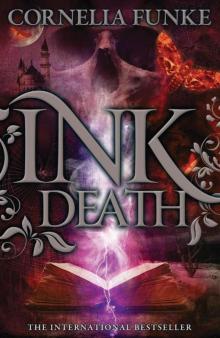 Inkdeath
Inkdeath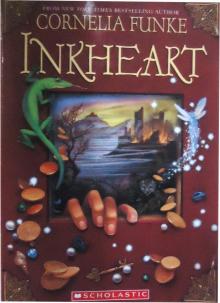 Inkheart
Inkheart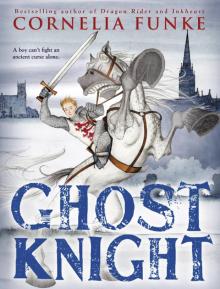 Ghost Knight
Ghost Knight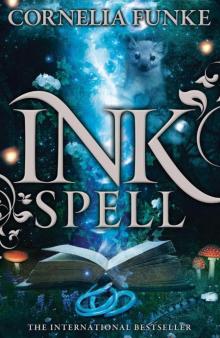 Inkspell
Inkspell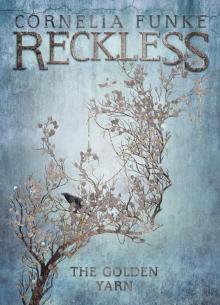 The Golden Yarn
The Golden Yarn Fearless
Fearless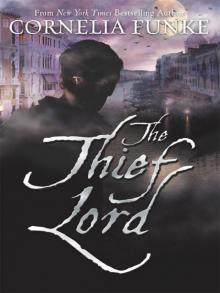 The Thief Lord
The Thief Lord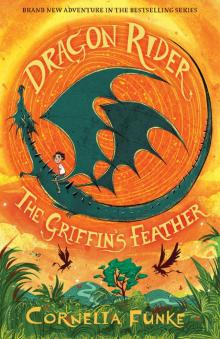 The Griffin's Feather
The Griffin's Feather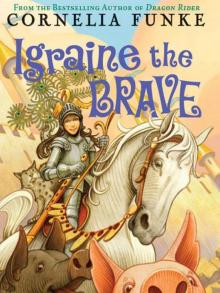 Igraine the Brave
Igraine the Brave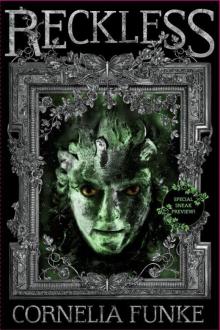 Reckless
Reckless When Santa Fell to Earth
When Santa Fell to Earth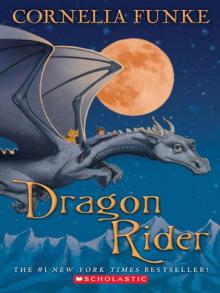 Dragon Rider
Dragon Rider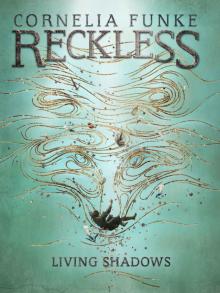 Living Shadows
Living Shadows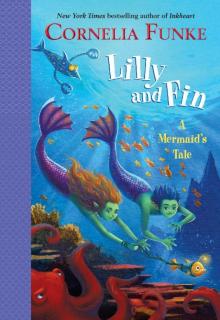 Lilly and Fin: A Mermaid's Tale
Lilly and Fin: A Mermaid's Tale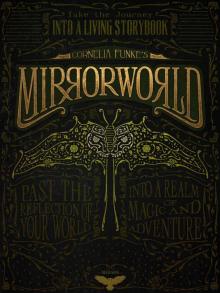 The MirrorWorld Anthology
The MirrorWorld Anthology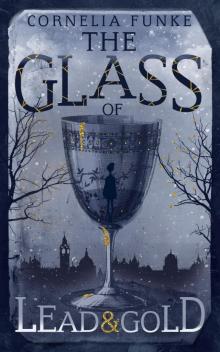 The Glass of Lead and Gold
The Glass of Lead and Gold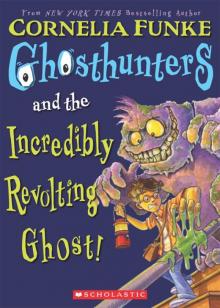 Ghosthunters and the Incredibly Revolting Ghost
Ghosthunters and the Incredibly Revolting Ghost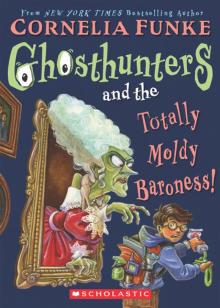 Ghosthunters and the Totally Moldy Baroness!
Ghosthunters and the Totally Moldy Baroness!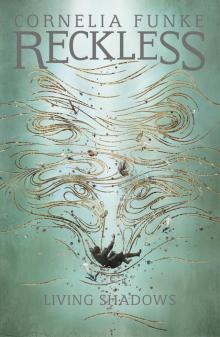 Reckless II
Reckless II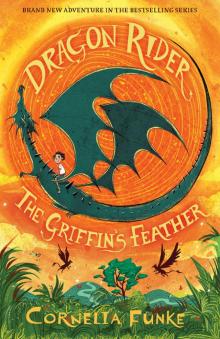 Griffin's Feather
Griffin's Feather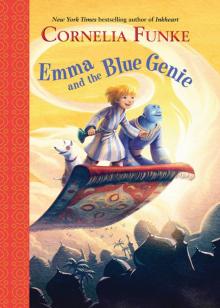 Emma and the Blue Genie
Emma and the Blue Genie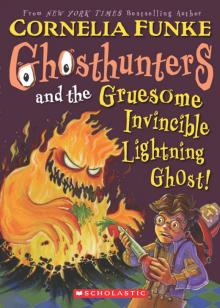 Ghosthunters and the Gruesome Invincible Lightning Ghost
Ghosthunters and the Gruesome Invincible Lightning Ghost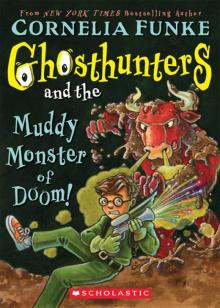 Ghosthunters and the Muddy Monster of Doom!
Ghosthunters and the Muddy Monster of Doom!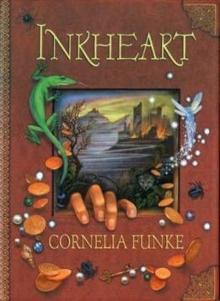 Inkheart ti-1
Inkheart ti-1 The Pirate Pig
The Pirate Pig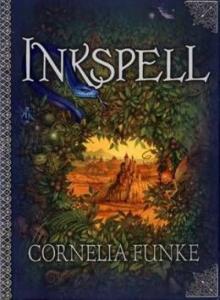 Inkspell ti-2
Inkspell ti-2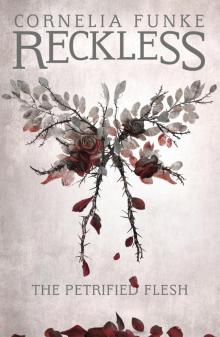 The Petrified Flesh
The Petrified Flesh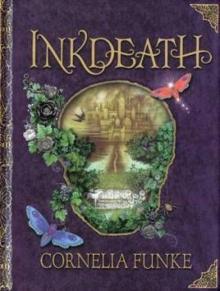 Inkdeath ti-3
Inkdeath ti-3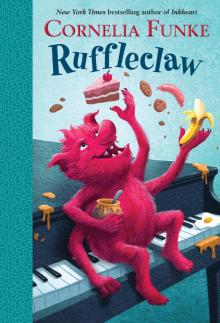 Ruffleclaw
Ruffleclaw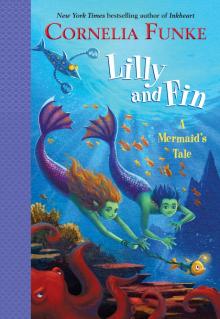 Lilly and Fin
Lilly and Fin